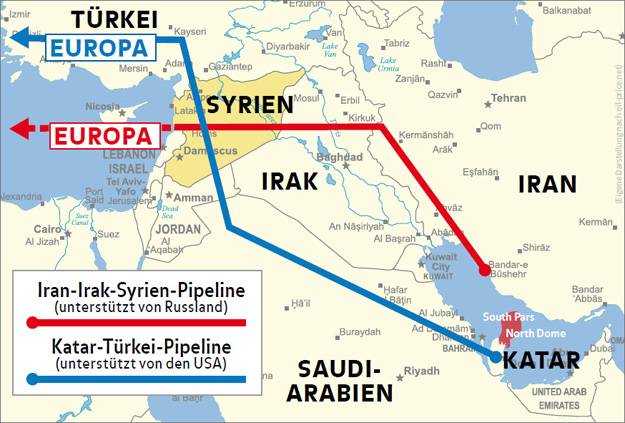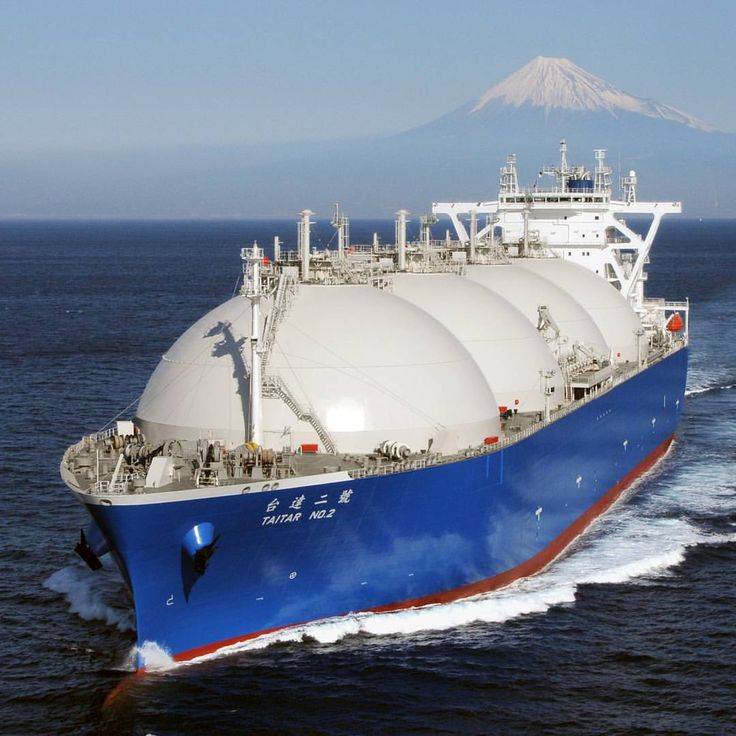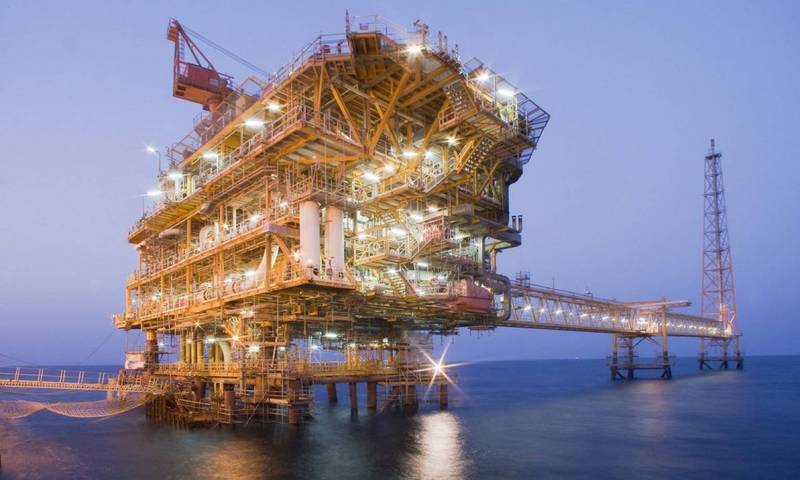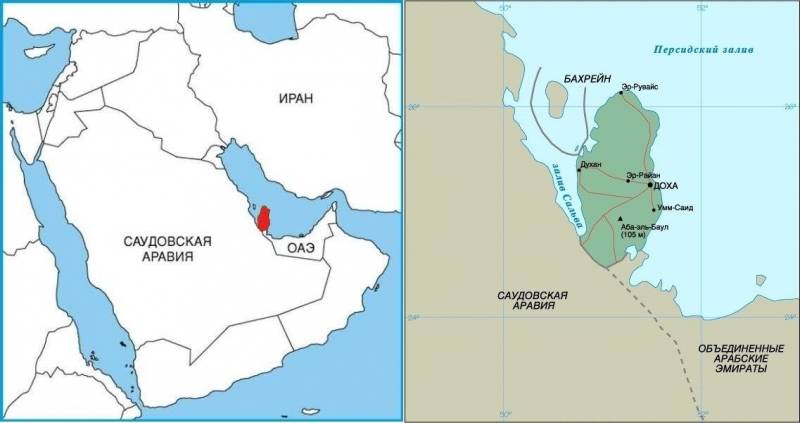Gas Qatar: no damn snuffbox at all
Natural gas, Qatari interest
Many people learned about the very existence of the state of Qatar only when this tiny country on the edge of the Arabian Peninsula received the right to host the world football championship in 2022. Only a few now know where Qatar is located, and only specialists and especially advanced public know why the country is separated from Saudi Arabia by a canal and how it has existed for many years under conditions of an almost complete blockade by Arab neighbors.
Qatar is believed to be a kind of pro-Iranian enclave on the other side of the Persian Gulf. Deliveries from Iran really support life in Qatar at a very high level, but at the same time, this state has always been considered almost the most reliable and trusted US ally in the region. Interest in Qatar was revived by the events of recent months, when a large gas bargaining unfolded, associated with the prospects of Nord Stream 2 and the supply of liquefied natural gas not only to rich Europe, but also to all continents of the world.
Doha (the capital of the State of Qatar) today is playing more and more actively in the world market, and above all against Russia. As you can see, the prospect of settling in the European market is too tempting, where no one thought to invite Qatar. On May 24, the chief executive officer of QPG State Oil and Gas Company Saad al-Qaabi announced in the Qatari capital:
The businessman substantiated his statement by saying that “we are the most efficient gas producer in the world in terms of costs and therefore we can overcome market shocks.” Mr. al-Qa'abi also added, it seems, to Russia that "many producers will curtail production because of low prices, but for Qatar this scenario is excluded."
It is typical that the very next day Gazprom suspended the export pumping of gas through the Yamal-Europe pipeline (Russia - Belarus - Poland - Germany) for an indefinite period, whose share in Russian gas supplies to the EU is not less than 25%. According to the RF Energy Security Fund of May 26, this is due to the continuing decline in prices and demand in Europe, primarily for pipeline gas.
The issue of growth in LNG supplies, especially Qatari, to Europe was said in a statement only secondarily. However, it is already known that such deliveries in January-April 2020 increased by 15%, with 60% of this growth again occurring in Qatar. And in the context of the statement by the head of QPG, we note that this company shortly before the pandemic managed to conclude contracts in Japan and South Korea for the construction of more than 2020 low- and medium-capacity LNG tankers in 2026-80. And this is in addition to the already existing Qatar 55 ...
For many years to come
Qatar was preparing for a "gas" confrontation with Moscow, as it turns out, half a century ago. On May 29, 1970, the British Commissariat in Qatar, the emirate in the northeast of the Arabian Peninsula, proclaimed the first autonomous government of the emirate. What is called, with a distant "gas" sight.
Since the 1915th century, the country has been led by the dynastic Al-Thani family, which was first under the protectorate of the Ottomans, and then, since XNUMX, already by the British. The first autonomous government of Qatar was established, we repeat, exactly half a century ago, when British firms set a point in the first large-scale studies of the oil and gas resources of the emirate.
Already then huge gas pantries were installed, which can be used in a growing volume for gas supply to the West. Moreover, it was precisely in London that they actively opposed, especially in the 1970s, against long-term gas supplies from the USSR. Six months after the creation of the first autonomous government of Qatar, British business began the development of large reserves of natural gas explored in the 60s off the west and north-east coast of the country.
From the beginning of the 70s, an increasing volume of reserves was explored by British and then American companies. Since the spring of 1974, the oil and gas industry of Qatar and all these works have come under the control of the state company Qatar petroleum-gas (QPG), controlled by the Al-Thani dynasty. This country, with a territory half that of the Moscow Region and a two-million population in the 80s, has become the largest player in the global gas market.
In Qatar, LNG has always been preferred - liquefied gas, because the pipes are pulled too far, and they will pass through not very calm regions. Tankers can sail as long as they like - the main thing is that there is enough capacity for LNG reception. The global demand for LNG has grown many times since the beginning of the 70s, and today it is competing unsuccessfully with demand for pipeline gas.
British, American, and also Italian and Japanese companies have actually created the gas industry in Qatar from scratch. At the same time, they do not even claim high shares in the created capacities. This is done so as not to politically interfere with the Qatari authorities to increase competition with Soviet and then Russian gas. Not surprisingly, since the second half of the 70s, almost all of Qatar’s gas and oil and gas infrastructure as a whole have remained under the jurisdiction of the special forces of the US Air Force and the US Navy. Qatar acts in the modest role of a full-fledged ally there.
One cannot but recall that Great Britain declared the independence of Qatar on September 3, 1971, although under pressure from the United States and Saudi Arabia. The geographic location of the emirate, which literally "wedges" into the center of the Persian Gulf, and even with large reserves of gas and oil, greatly prevented London from "parting" with Qatar.
But since 1956, after the defeat of Britain in the war with Egypt over the Suez Canal, the geopolitical alignment in the region was not in favor of London. This forced the British in 1961 to grant independence to their main oil and gas "box" in the region - Kuwait, in 1967 - to South Yemen. And in the early 70s, along with Qatar, also Bahrain, Oman, the United Arab Emirates (then Treaty of Oman), where there are not much less oil and gas resources than in Qatar. Suren Baliev, deputy minister of gas industry of the USSR, and then director of the academic Center for Oil and Gas Information, noted:
In the future, this project was mothballed, as S. Baliyev noted, in favor of the development of the Qatari LNG production, but the same project "remains in the future, in order, along with the Qatari, Kuwaiti and Algerian LNG, to reduce the dependence of Western Europe on Soviet gas supplies."

Meanwhile, gas production in Qatar grew by leaps and bounds. According to national statistics, Qatar's average annual production increased from 5,5 billion cubic meters on average for 1971-1976. up to 20 billion in 1980-1985 and up to 180 billion cubic meters in 2019. The jerk was successful due to the colossal resource base and low cost of production - one of the lowest in the world in this industry. This is the 4th place in the world (after the USA, Russia and Iran).
Liquid market
According to OPEC and the International Energy Agency for 2019-2020, the volume of gas reserves (natural and gas condensate) in Qatar is about 14% of the world. At the same time, at least 65% of these reserves are developed and processed. The production of LNG in Qatar is a record in terms of capacity and volume: it is produced on 14 lines with a total capacity of 104,7 billion cubic meters. meters per year, created in the mid-80s - early 2010s by companies in the USA, Great Britain, Italy and Japan.
This represents about 25% of global LNG capacity (2019). Almost all of them are state-owned: the shareholding in the national state-owned company (QPG) in them is 70-85%. At the same time, Qatar has long had a huge national fleet tankers: according to 2019, these are 55 technologically advanced medium and high capacity gas carriers. Most of them are South Korean-built Q-max class with a deadweight of 270 thousand tons and Q-flex with a deadweight of 166 thousand tons.

Such vessels fully supply Qatari LNG to almost 30 countries, including China, Japan and 10 EU countries. And in terms of the volume of exports of this product (up to 110 billion cubic meters in 2019), Qatar has an almost 25 percent share in the global export of LNG. And this is what it has been since the early 2000s.
The mentioned project of the trans-Arabian gas pipeline Qatar-Kuwait-Iraq-Saudi Arabia-Turkey-Europe is not forgotten. The National portal from the UAE and the Russian Internet resource Around Gas recently reported that since 2011 this project has been finalized by a Qatari-Turkish expert group with the participation of British and American experts. The group was created in 2009 by a joint decision of Turkish President R. Erdogan and Emir of Qatar Hamad bin Khalifa Al-Thani.
The well-known political scientist and publicist Robert Kennedy Jr., who comes from a well-known family, the son of Senator Robert Kennedy and the nephew of President John F. Kennedy, quite objectively characterizes the economic and geopolitical goals of the project. Back in February 2016, he wrote in the American journal Politico (Arlington):
Moreover, "Qatar hosts two huge US military bases and the headquarters of the US Central Command in the Middle East."
Project implementation
But naturally, that
In a word, Qatari gas is a lever for further, besides multilateral political and economic pressure on Moscow. Moreover, liquefied gas is already a very real lever, which also comes in a duet with the American one, and pipelines are only potential so far. And Qatar, with all its unambiguous dependence on Iran, has been prepared for this role since the 70s of the last century.
However, much could have turned out quite differently if the new leadership of the USSR after Stalin had not rejected all projects for the production of LNG and, accordingly, its export. The choice at that time was unambiguously in favor of the record-breaking creation of raw material pipelines to Europe. Our country could well get ahead not only of Qatar in "liquefying" the world gas market ...
- Alexey Podymov, Alexey Chichkin
- irtag.info, iran.ru, gastopowerjournal.com


Information